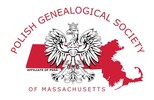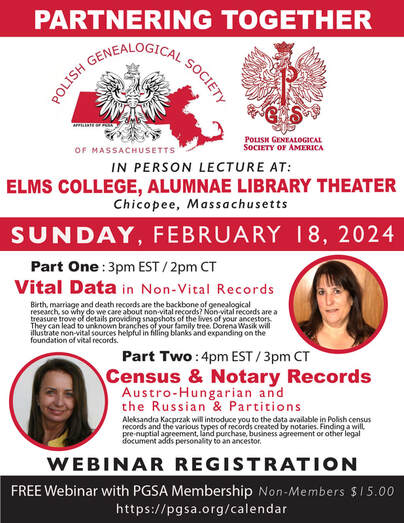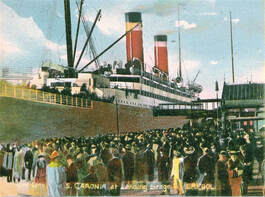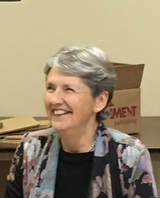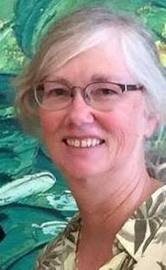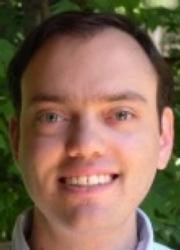Upcoming 2025 PGSA / PGSMA Events

May Webinar – Polish Peasants’ Life in the 18th Century – Myths, Stereotypes, and Reality
by Piotr Zelny
Sunday, May 18 at 3 pm EST
Genealogy researcher Piotr Zelny, of Polish Origins, will add the vitality of day-to-day life to sterile vital records. For Piotr, how people actually lived, with the good and the bad, is of special interest. It brings the world of your ancestors alive. So also are the not quite true stories which evolved over time.
Please note: Registering for this webinar is a 2-step process. Once you go through the bookstore, you will receive a receipt with a download of the PDF file. That file contains the registration link that you will use to complete the registration. Please do not share the link. If you do not receive a receipt, contact us at [email protected]
Original price was $15.00. Current price is $0.00.
CLICK HERE TO BEGIN REGISTERING
by Piotr Zelny
Sunday, May 18 at 3 pm EST
Genealogy researcher Piotr Zelny, of Polish Origins, will add the vitality of day-to-day life to sterile vital records. For Piotr, how people actually lived, with the good and the bad, is of special interest. It brings the world of your ancestors alive. So also are the not quite true stories which evolved over time.
Please note: Registering for this webinar is a 2-step process. Once you go through the bookstore, you will receive a receipt with a download of the PDF file. That file contains the registration link that you will use to complete the registration. Please do not share the link. If you do not receive a receipt, contact us at [email protected]
Original price was $15.00. Current price is $0.00.
CLICK HERE TO BEGIN REGISTERING
Past Events

Comparison of Vital Records in the Austrian Partition of Poland with Records of Upper Silesia under German Administration
by Maciej Orzechowski
Sunday, February 16, 2025
3:00 pm EST
Free webinar with PGSA/PGSMA membership / Non-members $15
Click here for more information or to register
Maciej Orzechowski will present important facts comparing how records were written in German administered Upper Silesia which had a Polish population, against records in the Austrian Partition of Poland. From the perspective of a genealogist, he will illustrate key similarities, differences, advantages, disadvantages, and cautions to be exercised when creating a family history from these regions.
Maciej is one of only two researchers allowed access to the Przemyśl Archdiocesan Archives, and an expert on the archives in Sanok and elsewhere in Galicia. He has written articles published in Rodziny, presented on PGSA webinars and worked with PGSA members.
by Maciej Orzechowski
Sunday, February 16, 2025
3:00 pm EST
Free webinar with PGSA/PGSMA membership / Non-members $15
Click here for more information or to register
Maciej Orzechowski will present important facts comparing how records were written in German administered Upper Silesia which had a Polish population, against records in the Austrian Partition of Poland. From the perspective of a genealogist, he will illustrate key similarities, differences, advantages, disadvantages, and cautions to be exercised when creating a family history from these regions.
Maciej is one of only two researchers allowed access to the Przemyśl Archdiocesan Archives, and an expert on the archives in Sanok and elsewhere in Galicia. He has written articles published in Rodziny, presented on PGSA webinars and worked with PGSA members.
|
PGSA/PGSMS Webinar Double Feature
The Polish Collection at Central Connecticut State University by Renata C. Vickrey and The History, Documents and Exhibit of the Kosciuszko Squadron by Waldemar Kostrzewa Saturday, January 18, 2025 12:00 pm EST Free webinar with PGSA/PGSMA membership; non-members $15 Join us this January online for a wonderful double-feature of talks! First, did you know that Central Connecticut State University has an amazing collection of Polish American memorabilia online including parish jubilee books?! Secondly, the history of the Kościuszko Squadron is a fascinating piece of Polish American history you’ll greatly enjoy learning about. Register here: https://pgsa.org/product/webinar-polish-collection/ |

PGSA/PGSMS Webinar
Deciphering Cursive Script & Poor Handwriting
by Karl von Loewe
Sunday, May 19, 2024; 3:00 pm EST (2:00 PM Central Time)
In addition to the challenge of working with records in Polish, German, Latin and Russian, particularly those more than 100 years old, how often do you confront a strange cursive style, idiosyncratic handwriting, poor penmanship or damaged pages that impair legibility? Karl von Loewe will explore solutions to
help reduced the frustration when you encounter these and related roadblocks. Click here for more information or to register.
About our speaker: Karl von Loewe grew up in Minneapolis, Minnesota. Having earned a Ph.D. in history, during his career in the academic world his book and articles were published in the United States, Canada and Europe. He has lived and travelled widely in Russia and eastern Europe as a student, researcher and genealogist. His many publications include not only academic articles, but most recently studies in family genealogy. His most recent book, Lost Roots: Family, Identity, and Abandoned Ancestry, was published in 2022. He lives in New Jersey with his wife, Judy.
Deciphering Cursive Script & Poor Handwriting
by Karl von Loewe
Sunday, May 19, 2024; 3:00 pm EST (2:00 PM Central Time)
In addition to the challenge of working with records in Polish, German, Latin and Russian, particularly those more than 100 years old, how often do you confront a strange cursive style, idiosyncratic handwriting, poor penmanship or damaged pages that impair legibility? Karl von Loewe will explore solutions to
help reduced the frustration when you encounter these and related roadblocks. Click here for more information or to register.
About our speaker: Karl von Loewe grew up in Minneapolis, Minnesota. Having earned a Ph.D. in history, during his career in the academic world his book and articles were published in the United States, Canada and Europe. He has lived and travelled widely in Russia and eastern Europe as a student, researcher and genealogist. His many publications include not only academic articles, but most recently studies in family genealogy. His most recent book, Lost Roots: Family, Identity, and Abandoned Ancestry, was published in 2022. He lives in New Jersey with his wife, Judy.

Coffee Hour with a Polish Genealogist
Saturday, May 4, 2024
10am Eastern / 9am Central
Online
Professional Polish genealogist Aleksandra Kacprzak will be available to answer your questions on Polish Genealogy. Email your question to [email protected] by April 27. Aleksandra will answer as many questions as possible.
Saturday, May 4, 2024
10am Eastern / 9am Central
Online
Professional Polish genealogist Aleksandra Kacprzak will be available to answer your questions on Polish Genealogy. Email your question to [email protected] by April 27. Aleksandra will answer as many questions as possible.
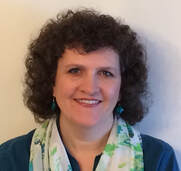
PGSMA Fall Meeting
Using Gazetteers and Maps for Polish Genealogy
By Julie Roberts Szczepankiewicz
Saturday, November 4, 2023, 1-3 pm EST
Chicopee Public Library
History and geography are inextricably linked, so genealogical research requires an ability to accurately identify and locate places mentioned in historical documents. It’s also important to understand the administrative hierarchy for the government of a place, since different types of records were created at different levels of government. This lecture provides an introduction to a number of different digitized gazetteers (geographical dictionaries) and databases that are useful for identifying places presently or formerly located in Poland, including two phonetic gazetteers which are helpful when place names are misspelled in historical records. Additionally, Julie will identify sources for online maps for Polish genealogy, including cadastral maps, and discuss genealogical uses for Google’s My Map utility.
About Our Speaker: Julie Roberts Szczepankiewicz is a genealogist, writer, and speaker with nearly 30 years of experience in researching her family's origins in Poland, Germany, the U.S. and Canada. She holds a bachelor's degree in biological sciences from the State University of New York in Buffalo and a master's degree in endocrinology from the University of California, Berkeley. Her passion for genealogical research started when she was a graduate student, after she was given a copy of her great-grandparents' marriage record as a gift. After reading the names of a previously-unknown generation of ancestors on that document, she was hooked. She currently serves as President of the Polish Genealogical Society of New York State (PGSNYS), Vice-President for the New England Regional Genealogical Consortium, Inc., and Secretary for the Polish Genealogical Society of Massachusetts, as well as administrator to several genealogy-related Facebook groups. Her articles have been published in the newsletters of the Polish Genealogical Society of America, the Western New York Genealogical Society, PGSMA, and PGSNYS, and she is the author of a genealogy blog, From Shepherds and Shoemakers.
Using Gazetteers and Maps for Polish Genealogy
By Julie Roberts Szczepankiewicz
Saturday, November 4, 2023, 1-3 pm EST
Chicopee Public Library
History and geography are inextricably linked, so genealogical research requires an ability to accurately identify and locate places mentioned in historical documents. It’s also important to understand the administrative hierarchy for the government of a place, since different types of records were created at different levels of government. This lecture provides an introduction to a number of different digitized gazetteers (geographical dictionaries) and databases that are useful for identifying places presently or formerly located in Poland, including two phonetic gazetteers which are helpful when place names are misspelled in historical records. Additionally, Julie will identify sources for online maps for Polish genealogy, including cadastral maps, and discuss genealogical uses for Google’s My Map utility.
About Our Speaker: Julie Roberts Szczepankiewicz is a genealogist, writer, and speaker with nearly 30 years of experience in researching her family's origins in Poland, Germany, the U.S. and Canada. She holds a bachelor's degree in biological sciences from the State University of New York in Buffalo and a master's degree in endocrinology from the University of California, Berkeley. Her passion for genealogical research started when she was a graduate student, after she was given a copy of her great-grandparents' marriage record as a gift. After reading the names of a previously-unknown generation of ancestors on that document, she was hooked. She currently serves as President of the Polish Genealogical Society of New York State (PGSNYS), Vice-President for the New England Regional Genealogical Consortium, Inc., and Secretary for the Polish Genealogical Society of Massachusetts, as well as administrator to several genealogy-related Facebook groups. Her articles have been published in the newsletters of the Polish Genealogical Society of America, the Western New York Genealogical Society, PGSMA, and PGSNYS, and she is the author of a genealogy blog, From Shepherds and Shoemakers.
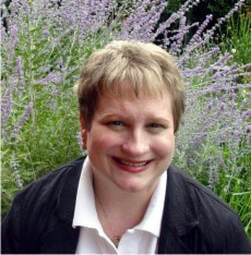
Summer Zoom Webinar
Immigrant Cluster Communities: Past, Present and Future
by Lisa Ann Alzo, MFA
Thursday, June 29, 2023 at 7:00 pm EST
There are a handful of “cluster” immigrant communities throughout the United States that blossomed during the immigration influx of the late 19th and early 20th centuries. Exploring “cluster genealogy”—the process of researching those relatives, friends, and neighbors who lived near an ancestor—can often break down brick walls in the search for individual family lines and help to place our ancestors’ lives in historical context. For those descendants who’ve moved away from such traditional immigrant enclaves, 21st-century technology can be used to rebuild “cluster communities” in the virtual world. This lecture will cover: How to identify chain migrations/cluster communities using key records; ways to share and collaborate with other researchers, and the benefits, pitfalls, and obstacles associate with a shift to “virtual” cluster communities; and how to use tools such as social networking sites, Wikis, etc. build online genealogical communities.
About Our Speaker: Lisa A. Alzo, M.F.A., is a freelance writer, instructor, and internationally recognized lecturer, specializing in Eastern European research and writing your family history. She is the author of eleven books and hundreds of magazine articles. Lisa works as an online educator and writing coach and developed the Eastern European Research Certificate Program for the International Institute of Genealogical Studies. Visit for more information.
Immigrant Cluster Communities: Past, Present and Future
by Lisa Ann Alzo, MFA
Thursday, June 29, 2023 at 7:00 pm EST
There are a handful of “cluster” immigrant communities throughout the United States that blossomed during the immigration influx of the late 19th and early 20th centuries. Exploring “cluster genealogy”—the process of researching those relatives, friends, and neighbors who lived near an ancestor—can often break down brick walls in the search for individual family lines and help to place our ancestors’ lives in historical context. For those descendants who’ve moved away from such traditional immigrant enclaves, 21st-century technology can be used to rebuild “cluster communities” in the virtual world. This lecture will cover: How to identify chain migrations/cluster communities using key records; ways to share and collaborate with other researchers, and the benefits, pitfalls, and obstacles associate with a shift to “virtual” cluster communities; and how to use tools such as social networking sites, Wikis, etc. build online genealogical communities.
About Our Speaker: Lisa A. Alzo, M.F.A., is a freelance writer, instructor, and internationally recognized lecturer, specializing in Eastern European research and writing your family history. She is the author of eleven books and hundreds of magazine articles. Lisa works as an online educator and writing coach and developed the Eastern European Research Certificate Program for the International Institute of Genealogical Studies. Visit for more information.
The PGSMA Spring, Multi-Speaker Free Event with One-on-One Consultations
Whom Do I Ask, Grandma & Grandpa Gone? Discover Your Heritage with PGSMA
Saturday, April 29, 2023
Elms College
291 Springfield St, Chicopee, MA 01013
Whom Do I Ask, Grandma & Grandpa Gone? Discover Your Heritage with PGSMA
Saturday, April 29, 2023
Elms College
291 Springfield St, Chicopee, MA 01013
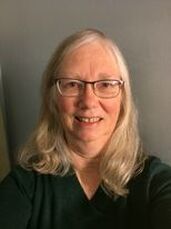
PGSMA Spring Talk
Co-Sponsor Chicopee Public Library
Searching the 1950 Census
by Sara Szymanowicz Campbell
Chicopee Public Library
Thursday, March 30, 2023 at 6:30 pm
The 1950 census has been released, and some of us will find our own name for the first time! Artificial Intelligence was employed to index the handwritten records, and was surprisingly successful. We will cover some tips to find the individuals we seek, status of the human review of the indexing, and the highlights of the unique information collected in this census. Did you know you can provide corrections as you find errors in the transcription? Just too wet your appetite, we will touch on the information to be found in the 1960 census, to be released in 2033. Are you counting the days yet? This meeting is FREE, BRING A FRIEND!
About Our Speaker: Sara Campbell is a researcher, author and educator. She is a former officer of PGSMA. She began her own family research 30 years ago. and has self-published a six-generation history book about her family, as well as editing a memoir for a friend. Sara is a frequent speaker in the region and will be presenting three sessions at NERGC in May 3-6, 2023 in Springfield. The meeting will be at Chicopee Public Library.
Co-Sponsor Chicopee Public Library
Searching the 1950 Census
by Sara Szymanowicz Campbell
Chicopee Public Library
Thursday, March 30, 2023 at 6:30 pm
The 1950 census has been released, and some of us will find our own name for the first time! Artificial Intelligence was employed to index the handwritten records, and was surprisingly successful. We will cover some tips to find the individuals we seek, status of the human review of the indexing, and the highlights of the unique information collected in this census. Did you know you can provide corrections as you find errors in the transcription? Just too wet your appetite, we will touch on the information to be found in the 1960 census, to be released in 2033. Are you counting the days yet? This meeting is FREE, BRING A FRIEND!
About Our Speaker: Sara Campbell is a researcher, author and educator. She is a former officer of PGSMA. She began her own family research 30 years ago. and has self-published a six-generation history book about her family, as well as editing a memoir for a friend. Sara is a frequent speaker in the region and will be presenting three sessions at NERGC in May 3-6, 2023 in Springfield. The meeting will be at Chicopee Public Library.
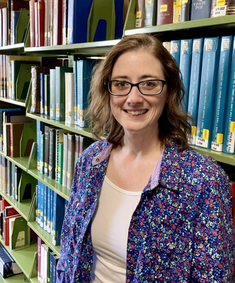
October 2022 Online Talk
Getting Acquainted with the Genealogical Proof Standard (GPS)
by Jeanette Sheliga
October 27, 2022 at 7-9 pm
Having a research plan is always a good idea when researching your ancestors. This presentation will introduce the audience to the Genealogical Proof Standard and demonstrate how following through the steps will help you solve your genealogy research questions and hopefully bust through some of the brick walls that you might have.
About the Speaker: Jeanette Sheliga of Jeanette’s Genealogy lives in Lockport, NY and has been researching her family tree since 2002 and lecturing since 2011. She has had the privilege to speak for societies and libraries locally and virtually all over the world. Jeanette is the President of the Virtual Genealogical Association (VGA), holds many offices in her local societies, completed the ProGen Study Group 49, and has attended many genealogy institutes.
Getting Acquainted with the Genealogical Proof Standard (GPS)
by Jeanette Sheliga
October 27, 2022 at 7-9 pm
Having a research plan is always a good idea when researching your ancestors. This presentation will introduce the audience to the Genealogical Proof Standard and demonstrate how following through the steps will help you solve your genealogy research questions and hopefully bust through some of the brick walls that you might have.
About the Speaker: Jeanette Sheliga of Jeanette’s Genealogy lives in Lockport, NY and has been researching her family tree since 2002 and lecturing since 2011. She has had the privilege to speak for societies and libraries locally and virtually all over the world. Jeanette is the President of the Virtual Genealogical Association (VGA), holds many offices in her local societies, completed the ProGen Study Group 49, and has attended many genealogy institutes.
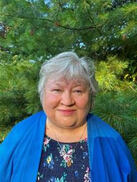
August 2022 PGSMA-PGSNYS JOINT ZOOM MEETING
Collaborating with DNA Matches: Finding a Common Location Using a Variety of Sources
by Sandra Maciejewski Porter
Thursday, August 11, 2022, 7-9 pm EST
Sandra describes how she found the ancestors of her distant DNA cousins in the old country—the clues they found along the way, the puzzles they solved, and the resources they used — to find the Polish names of her DNA match’s immigrant ancestors, their immigration records, their marriage in the old country, and their parents’ names and records, all in places close to where Sandra’s immigrant great- grandparents were married in 1869.
About Our Speaker: A member of both the PGSNYS and the PGSMA, Sandra Maciejewski Porter enjoys puzzling over family history and fitting in pieces over time. As a child growing up in Buffalo, New York, she was always meeting relatives and asking about extended family relationships, so when her family purchased a personal computer in 1991, she used it to organize, record, and share family history. She has written articles for the PGSNYS newsletter Searchers about her study of her ancestors and their families in the Prussian (German) and Russian partitions of Poland in the 19th century. DNA analysis has added another dimension to her research. Sandra lives in North Kingstown, Rhode Island, and blogs about her discoveries at myfamilyhistoryresearch.wordpress.com.
Collaborating with DNA Matches: Finding a Common Location Using a Variety of Sources
by Sandra Maciejewski Porter
Thursday, August 11, 2022, 7-9 pm EST
Sandra describes how she found the ancestors of her distant DNA cousins in the old country—the clues they found along the way, the puzzles they solved, and the resources they used — to find the Polish names of her DNA match’s immigrant ancestors, their immigration records, their marriage in the old country, and their parents’ names and records, all in places close to where Sandra’s immigrant great- grandparents were married in 1869.
About Our Speaker: A member of both the PGSNYS and the PGSMA, Sandra Maciejewski Porter enjoys puzzling over family history and fitting in pieces over time. As a child growing up in Buffalo, New York, she was always meeting relatives and asking about extended family relationships, so when her family purchased a personal computer in 1991, she used it to organize, record, and share family history. She has written articles for the PGSNYS newsletter Searchers about her study of her ancestors and their families in the Prussian (German) and Russian partitions of Poland in the 19th century. DNA analysis has added another dimension to her research. Sandra lives in North Kingstown, Rhode Island, and blogs about her discoveries at myfamilyhistoryresearch.wordpress.com.
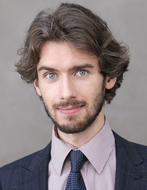
June 2022 Members-Only Online Talk
Polish DNA: Stories it reveals and the ways to use it for genealogical purposes
by Eryk Jan Grzeszkowiak
Saturday, June 25, 2022, 1 pm
Have you ever wondered what mysteries are hidden in Polish DNA? Over the last millennium Poland has been home to countless ethnic and religious groups – do modern Poles still have traces of their DNA? Do they affect their physical appearance or health? What are the best ways to make genealogical discoveries with Polish DNA?
Eryk Jan Grzeszkowiak, one of Poland’s genetic genealogy pioneers and a genetics researcher, will address these questions in the upcoming lecture on the 25th of June. He will explore the practical side of utilising DNA in genealogical research with a particular focus on making the most of genetic data in the Polish context. Which databases are most popular in Poland? What challenges do Polish genealogists face and what are the best ways to overcome them? Can DNA help you get past your genealogical brick wall?
The lecture will be followed by a 15 minute Q&A. Do not miss this opportunity - get ready for a journey through Polish DNA!
About Our Speaker: Eryk Jan Grzeszkowiak is a genetic genealogist holding a MSc degree in Human Complex Trait Genetics from the University of Edinburgh where he is currently working as a doctoral researcher in genetic epidemiology. In 2015 he started the first Polish blog devoted to genetic genealogy (genealogiagenetyczna.com). He has since worked with clients from all around the world and spoken at numerous and national and international genealogical and genetic-genealogical conferences, including the Annual Polish Genealogy Conference at the Royal Castle in Brzeg. He has been interviewed by various media, including TVN, one of the largest TV news stations in Poland, Esquire and Newsweek. His work has been frequently published in genetic and genealogical journals.
In 2020 he designed Poland’s first academic course in Genetic Genealogy which he taught at the CSW University in Warsaw. He currently teaches Genetics for Genetic Genealogists at the University of Strathclyde in Glasgow. In 2021 he launched a research project exploring Poles’ long-forgotten Scottish roots by utilising genetic genealogy to reunite Polish people with their Scottish cousins and reconstruct their pedigrees.
Polish DNA: Stories it reveals and the ways to use it for genealogical purposes
by Eryk Jan Grzeszkowiak
Saturday, June 25, 2022, 1 pm
Have you ever wondered what mysteries are hidden in Polish DNA? Over the last millennium Poland has been home to countless ethnic and religious groups – do modern Poles still have traces of their DNA? Do they affect their physical appearance or health? What are the best ways to make genealogical discoveries with Polish DNA?
Eryk Jan Grzeszkowiak, one of Poland’s genetic genealogy pioneers and a genetics researcher, will address these questions in the upcoming lecture on the 25th of June. He will explore the practical side of utilising DNA in genealogical research with a particular focus on making the most of genetic data in the Polish context. Which databases are most popular in Poland? What challenges do Polish genealogists face and what are the best ways to overcome them? Can DNA help you get past your genealogical brick wall?
The lecture will be followed by a 15 minute Q&A. Do not miss this opportunity - get ready for a journey through Polish DNA!
About Our Speaker: Eryk Jan Grzeszkowiak is a genetic genealogist holding a MSc degree in Human Complex Trait Genetics from the University of Edinburgh where he is currently working as a doctoral researcher in genetic epidemiology. In 2015 he started the first Polish blog devoted to genetic genealogy (genealogiagenetyczna.com). He has since worked with clients from all around the world and spoken at numerous and national and international genealogical and genetic-genealogical conferences, including the Annual Polish Genealogy Conference at the Royal Castle in Brzeg. He has been interviewed by various media, including TVN, one of the largest TV news stations in Poland, Esquire and Newsweek. His work has been frequently published in genetic and genealogical journals.
In 2020 he designed Poland’s first academic course in Genetic Genealogy which he taught at the CSW University in Warsaw. He currently teaches Genetics for Genetic Genealogists at the University of Strathclyde in Glasgow. In 2021 he launched a research project exploring Poles’ long-forgotten Scottish roots by utilising genetic genealogy to reunite Polish people with their Scottish cousins and reconstruct their pedigrees.
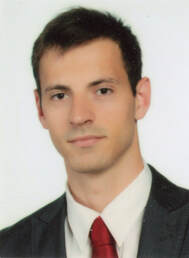
April 2022 Online Talk
The Polish Village, Town and Castle: Non-obvious Historical Sources to Enrich Your Genealogical Knowledge
by Jakub Jurek
Saturday, April 23, 2022 at 1 pm EST
Metrical books are the primary source of genealogical information, but they offer knowledge limited to certain facts of life and death. Reaching to other resources may give an opportunity to see your ancestors as living, everyday people – more than names, surnames and dates. Knowing what resources used to be created in the past is crucial to plan your research in non-metrical sources.
In this lecture, the speaker will describe several non-obvious sources of knowledge from different eras of Polish history, such as city books (księgi miejskie), castle books (księgi grodzkie), cadaster (księgi hipoteczne), status animarum (księgi dusz) and inventories (inwentarze), among others. City and castle books documented aspects of life of citizens and the nobles, mainly through the prism of their legal cases. Cadaster books date back to the beginning of the XIX-century and might be valuable for studying the possession of our ancestors. Status animarum are very rare, but highly interesting documents created by parishes. Inventories listed all mobile and immobile items possessed by a deceased or bankrupt person and often very detailed. All of these resources may also bring purely genealogical information that may prove useful when metrical books are not available. During the lecture, you will also have an opportunity to structure your knowledge about different periods of Polish history and learn the types of records typical for these periods as well as how to access them.
About Our Speaker: Jakub Jurek was born in Sieradz in 1991. He is professionally a biomedical engineering scientist, privately interested in regional history including family history, chief editor of “Na Sieradzkich Szlakach”, a magazine of the local division of the Polish Society of Tourism and Sightseeing (PTTK). His roots are in the historical Sieradz voivodship in central Poland, with traces to the neighboring Łęczyca voivodship, land of Wieluń and to a distant city of Pobiedziska in Greater Poland. Also, in a half of a quarter, he originates from the village of Bucze and its neighborhood in Lesser Poland.
Despite the school-induced hatred for history, he admits he always got curious when the history concerned himself or his town. Genealogy was his first direct contact with history and that’s where the bait was swallowed for good. He started his family tree research at the age of 17 by drawing a tree of all family members he could remember with the help of his relatives. It soon turned out not to be enough, especially that the tree barely reached the end of the XIX century. That turned him to get in touch with parish and state archives. Throughout the years, he became familiar with multiple types of historical records, many of which were useful for genealogical research. His specialty remains the region of central Poland, which during the partitions period was invaded by Prussia (1793-1806) and then by Russia (1809-1918).
During a short period, he conducted genealogical research for others within his own company. Although he mostly completed the work on his genealogical tree, he continues to research his hometown history and keeps contact with historical records.
In 2020 he designed Poland’s first academic course in Genetic Genealogy which he taught at the CSW University in Warsaw. He currently teaches Genetics for Genetic Genealogists at the University of Strathclyde in Glasgow. In 2021 he launched a research project exploring Poles’ long-forgotten Scottish roots by utilising genetic genealogy to reunite Polish people with their Scottish cousins and reconstruct their pedigrees.
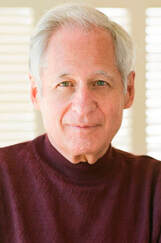
Spring 2022 In-Person Event Featuring Four Talks and Polish Luncheon
Exploring Family History with Stephen P. Morse
Saturday, March 26, 2022
Munich Haus Restaurant and Banquet Hall
13 Center St., Chicopee, MA 01013
The PGSMA is thrilled to have Stephen Morse back as the speaker at our multi-talk spring event to be held at handicap-accessible Munich Haus in Chicopee. Some members will remember our day with Steve Morse in 2015 fondly for the wealth of information we learned. Steve will present four talks — two in the morning and two in the afternoon. Attendees may choose to attend the morning session, the afternoon session, or both sessions. Those attending the afternoon session or both session will enjoy a full Polish lunch. There is no better way to spend a Saturday than with your genealogy colleagues learning from an expert!
About Our Speaker: Stephen Morse is the creator of the One-Step Website for which he has received both the Lifetime Achievement Award and the Outstanding Contribution Award from the International Association of Jewish Genealogical Societies, Award of Merit from the National Genealogical Society, first-ever Excellence Award from the Association of Professional Genealogists, and two awards that he cannot pronounce from Polish genealogical societies. In his other life Morse is a computer professional with a doctoral degree in electrical engineering. He has held various research, development, and teaching positions, authored numerous technical papers, written four textbooks, and holds four patents. He is best known as the architect of the Intel 8086 (the granddaddy of today's Pentium processor), which sparked the PC revolution nearly 40 years ago.
Exploring Family History with Stephen P. Morse
Saturday, March 26, 2022
Munich Haus Restaurant and Banquet Hall
13 Center St., Chicopee, MA 01013
The PGSMA is thrilled to have Stephen Morse back as the speaker at our multi-talk spring event to be held at handicap-accessible Munich Haus in Chicopee. Some members will remember our day with Steve Morse in 2015 fondly for the wealth of information we learned. Steve will present four talks — two in the morning and two in the afternoon. Attendees may choose to attend the morning session, the afternoon session, or both sessions. Those attending the afternoon session or both session will enjoy a full Polish lunch. There is no better way to spend a Saturday than with your genealogy colleagues learning from an expert!
About Our Speaker: Stephen Morse is the creator of the One-Step Website for which he has received both the Lifetime Achievement Award and the Outstanding Contribution Award from the International Association of Jewish Genealogical Societies, Award of Merit from the National Genealogical Society, first-ever Excellence Award from the Association of Professional Genealogists, and two awards that he cannot pronounce from Polish genealogical societies. In his other life Morse is a computer professional with a doctoral degree in electrical engineering. He has held various research, development, and teaching positions, authored numerous technical papers, written four textbooks, and holds four patents. He is best known as the architect of the Intel 8086 (the granddaddy of today's Pentium processor), which sparked the PC revolution nearly 40 years ago.
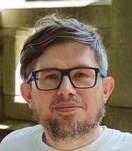
PGSMA February 2022 Free Online Event
Polish Genealogy beyond Metrical Books: Cadaster in Galicia, Liquidation Tables, and Notary Records in Central Poland
by Piotr Nojszewski
Saturday, February 26, 2022
There are two major reasons for searching for non-metrical sources in Polish genealogy. The first is one when you hit a brick wall due to lack of vital records and the second is to learn more about your ancestors and find illustrative material for your work. As most of the Polish immigrants came from small villages, sources connected with the land ownership are of the biggest value. During this lecture you will see examples of cadastral records for Galicia, liquidation tables and additional documents for Kingdom of Poland (Central Poland, Russian partition). You will learn how to look for such documents online and what to do if you cannot locate scans on the web.
About the Speaker: Piotr Nojszewski is Vice-President of the Warsaw Genealogical Society where he supports the popularization of genealogy. He gave many genealogy lectures and workshops e.g., during Polish National Genealogy Conference in Brzeg, Westfälischer Genealogentag and in the State Archive in Warsaw. His lectures cover areas such as introduction to Polish Genealogy, non-metrical sources for genealogy research, Poles in the Russian army and administration. He co-organized the international annual conference Central European Genealogy Meeting in Warsaw. His ancestors came mostly from historical Ziemia Liwska (Terra Liwensis, now part of Mazovia) and Northern Mazovia.
Polish Genealogy beyond Metrical Books: Cadaster in Galicia, Liquidation Tables, and Notary Records in Central Poland
by Piotr Nojszewski
Saturday, February 26, 2022
There are two major reasons for searching for non-metrical sources in Polish genealogy. The first is one when you hit a brick wall due to lack of vital records and the second is to learn more about your ancestors and find illustrative material for your work. As most of the Polish immigrants came from small villages, sources connected with the land ownership are of the biggest value. During this lecture you will see examples of cadastral records for Galicia, liquidation tables and additional documents for Kingdom of Poland (Central Poland, Russian partition). You will learn how to look for such documents online and what to do if you cannot locate scans on the web.
About the Speaker: Piotr Nojszewski is Vice-President of the Warsaw Genealogical Society where he supports the popularization of genealogy. He gave many genealogy lectures and workshops e.g., during Polish National Genealogy Conference in Brzeg, Westfälischer Genealogentag and in the State Archive in Warsaw. His lectures cover areas such as introduction to Polish Genealogy, non-metrical sources for genealogy research, Poles in the Russian army and administration. He co-organized the international annual conference Central European Genealogy Meeting in Warsaw. His ancestors came mostly from historical Ziemia Liwska (Terra Liwensis, now part of Mazovia) and Northern Mazovia.
PGSMA January Free Online Event
The Carpathian Mountains
by Dr. Patrice M. Dabrowski
Saturday, January 22, 2022
We’ll start the year with Dr. Patrice M. Dabrowski, who will talk about The Carpathians. This is an area of southern Poland (Galicia) from which many of our ancestors came. The presentation, which comes from her latest book, is centered on the Tatras, Eastern Carpathians, and Bieszczady mountains. This will include short histories of the colorful and feisty indigenous highlanders—Górale, Hutsuls, Boikos, and Lemkos, who are infrequently discussed. These local people who lived in the mountains were shepherds, weavers, woodcarvers, loggers and sometimes legendary brigands. Dr. Dabrowski will explain how these specific mountain ranges and highland folk were discovered by lowlanders, who came to climb and vacation in the mountains.
About the speaker: Dr. Patrice M. Dabrowski has taught and worked at Harvard, Brown, the University of Massachusetts at Amherst, and the University of Vienna. She is currently an Associate of the Harvard Ukrainian Research Institute (HURI), a member of the Board of Directors of the Polish Institute of Arts and Sciences of America (PIASA), and editor of H-Poland. A historian by training, Dr. Dabrowski is the author of three books: Commemorations and the Shaping of Modern Poland (2004), Poland: The First Thousand Years (2014; paperback edition, 2016), and The Carpathians: Discovering the Highlands of Poland and Ukraine (2021). Dr. Dabrowski has also just been awarded the 2021 Mary Zirin Prize in recognition of her standing as an independent scholar in the field of Slavic Studies.
The Carpathian Mountains
by Dr. Patrice M. Dabrowski
Saturday, January 22, 2022
We’ll start the year with Dr. Patrice M. Dabrowski, who will talk about The Carpathians. This is an area of southern Poland (Galicia) from which many of our ancestors came. The presentation, which comes from her latest book, is centered on the Tatras, Eastern Carpathians, and Bieszczady mountains. This will include short histories of the colorful and feisty indigenous highlanders—Górale, Hutsuls, Boikos, and Lemkos, who are infrequently discussed. These local people who lived in the mountains were shepherds, weavers, woodcarvers, loggers and sometimes legendary brigands. Dr. Dabrowski will explain how these specific mountain ranges and highland folk were discovered by lowlanders, who came to climb and vacation in the mountains.
About the speaker: Dr. Patrice M. Dabrowski has taught and worked at Harvard, Brown, the University of Massachusetts at Amherst, and the University of Vienna. She is currently an Associate of the Harvard Ukrainian Research Institute (HURI), a member of the Board of Directors of the Polish Institute of Arts and Sciences of America (PIASA), and editor of H-Poland. A historian by training, Dr. Dabrowski is the author of three books: Commemorations and the Shaping of Modern Poland (2004), Poland: The First Thousand Years (2014; paperback edition, 2016), and The Carpathians: Discovering the Highlands of Poland and Ukraine (2021). Dr. Dabrowski has also just been awarded the 2021 Mary Zirin Prize in recognition of her standing as an independent scholar in the field of Slavic Studies.
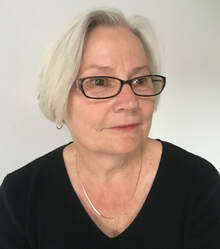
PGSMA December Online Event with a Holiday Theme
Polish Christmas Customs, Wigilia, and Opłatek
by Sophie Hodorowicz Knab
Sunday, December 5, 2021
1 p.m.
Please join us for program that is just in time for the holiday season! The sharing of the opłatek (Christmas wafer) on Christmas Eve is the most cherished of all Polish Christmas customs. On the eve of Christ's birth, the people of Poland and their descendants scattered all over the world, gather together at the table where they are about to share the evening meal, and first offer each other a thin piece of unleavened bread called opłatek. This presentation will discuss some of the historical origins and symbolism associated with the unleavened bread called opłatek.
Sophie Hodorowicz Knab immigrated to the United States with her parents and siblings in 1954. She grew in a Polish American community, learning how to speak English and becoming American in all ways but her Polish parents also instilled within her all the traditions and customs of their native land of Poland. As an adult, she cherishes her heritage and is always willing to share what she knows with others. She is a noted lecturer and author whose books include Polish Customs, Traditions and Folklore; Polish Country Cottage Cookbook; and her most recent release is titled Polish Herbs, Flowers and Folk Medicine. She is a contributor to the Polish American Journal and the Am-Pol Eagle.
Polish Christmas Customs, Wigilia, and Opłatek
by Sophie Hodorowicz Knab
Sunday, December 5, 2021
1 p.m.
Please join us for program that is just in time for the holiday season! The sharing of the opłatek (Christmas wafer) on Christmas Eve is the most cherished of all Polish Christmas customs. On the eve of Christ's birth, the people of Poland and their descendants scattered all over the world, gather together at the table where they are about to share the evening meal, and first offer each other a thin piece of unleavened bread called opłatek. This presentation will discuss some of the historical origins and symbolism associated with the unleavened bread called opłatek.
Sophie Hodorowicz Knab immigrated to the United States with her parents and siblings in 1954. She grew in a Polish American community, learning how to speak English and becoming American in all ways but her Polish parents also instilled within her all the traditions and customs of their native land of Poland. As an adult, she cherishes her heritage and is always willing to share what she knows with others. She is a noted lecturer and author whose books include Polish Customs, Traditions and Folklore; Polish Country Cottage Cookbook; and her most recent release is titled Polish Herbs, Flowers and Folk Medicine. She is a contributor to the Polish American Journal and the Am-Pol Eagle.
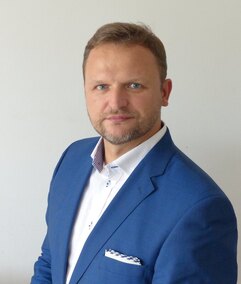
PGSMA November Online Event
Notary Records from Poland and Their Use in Genealogical Research
by Michał Marciniak
Saturday, November 6, 2021
1:00 p.m.
Notarial records are one of the more valuable documents in genealogy research, especially when you hit a roadblock due to a lack of vital records. Additionally, these records may contain details about the daily life of your ancestors and their property. During this presentation, you will learn what types of notarial records you may find in the archives, what you can learn from them, how to look for such records, and what to do if you cannot locate them online.
Michał Jan Marciniak is a practicing lawyer and a passionate genealogist. In 2005, Michał established his own genealogy research company "PolGen Research" offering a unique combination of legal and genealogical services to a wide variety of clients all over the world. Michał is also the President of the Genealogical Society of Warsaw, Vice President of the Association of Polish Professional Genealogists and a founding member of the Polish Genealogical Association. He is a lecturer at the Cardinal Stefan Wyszyński University in Warsaw at first postgraduate faculty "Genealogy. Theory and Practice".
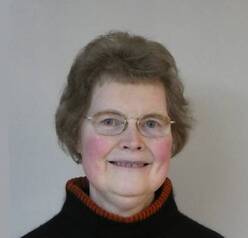
PGSMA October Online Event
Polish Art History From BC to Modern Times
by Sue Urban
Thursday, October 21, 2021
6:30 p.m.
Join us for a wonderful presentation to learn about the history and richness of Polish art through the ages! This presentation of Polish Art History from B.C. (Before Christ) to Modern Times will include a narrated slide show. The topics will be paintings, sculpture, architecture and graphics from all chronological time periods of art beginning with art from B.C. and ending with the present. There will be handouts for this event.
Susan Urban has taught classes, held public programs and published articles on various aspects of Polish Art and Crafts including, art, paper cutouts and Easter eggs. She has taught for over 25 years in western Mass Public Schools and is teaching Art at the George Walter Vincent Smith Art Museum in Springfield. Ms. Urban has degrees in arts and education from Cambridge College, Our Lady of the Elms College and the Nicolaus Copernicus University in Turin, Poland.
Polish Art History From BC to Modern Times
by Sue Urban
Thursday, October 21, 2021
6:30 p.m.
Join us for a wonderful presentation to learn about the history and richness of Polish art through the ages! This presentation of Polish Art History from B.C. (Before Christ) to Modern Times will include a narrated slide show. The topics will be paintings, sculpture, architecture and graphics from all chronological time periods of art beginning with art from B.C. and ending with the present. There will be handouts for this event.
Susan Urban has taught classes, held public programs and published articles on various aspects of Polish Art and Crafts including, art, paper cutouts and Easter eggs. She has taught for over 25 years in western Mass Public Schools and is teaching Art at the George Walter Vincent Smith Art Museum in Springfield. Ms. Urban has degrees in arts and education from Cambridge College, Our Lady of the Elms College and the Nicolaus Copernicus University in Turin, Poland.
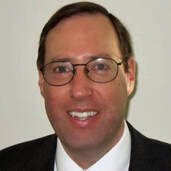
“FamilySearch Progress in Poland, Ukraine, Belarus, and Lithuania” and “Adventures in Genealogy”
by David Ouimette, CG, CGL
Saturday, June 12, 2021
For many years, FamilySearch has been an important resource for genealogical research into the lives of Polish ancestors, offering millions of scans of church and civil vital records for parishes and registry offices in all three partitions of Poland. In recent years, however, their collections have been increasing rapidly in both breadth and depth, including such diverse sources as notarial records, school records, conscription lists, revision lists, population registers, etc. for a growing number of locations throughout Eastern Europe.
In his first lecture “FamilySearch Progress in Poland, Ukraine, Belarus, and Lithuania,” David will offer an overview of FamilySearch’s efforts in microfilming and digital capture. He will explain the privacy restrictions that curtail the publication of certain collections of records, and he will provide some insight into the types of records targeted by FamilySearch for acquisition, indexing, and online publication. David’s second lecture at 1:30 pm, “Adventures in Genealogy,” provides an inspiring overview of genealogy around the world. The presentation consists of stories, photos, and videos from his travels in twenty of the sixty countries he’s visited for FamilySearch, illustrating the tremendous variety of traditions and records involving family history, culture by culture.
David Ouimette manages the Content Strategy team at FamilySearch in Salt Lake City, prioritizing the acquisition and online publication of historical records worldwide for family history research. David has researched in hundreds of archives in over sixty countries spanning all continents. A Trustee for the Board for Certification of Genealogists and a former board member of the National Genealogical Society, he recently presented “Tracing Polish Ancestors in the Austro-Hungarian Empire” at RootsTech 2021.
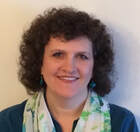
Joint Meeting of the Jewish Genealogical Society of Greater Boston and Polish Genealogical Society of Massachusetts
“Finding Vital Records from Poland Online”
Julie Roberts Szczepankiewicz
Sunday, May 23, 2021, 1:30 P.M.
For most of us, vital records (birth, marriage, and death records) comprise the backbone of our family tree. Tracing our ancestry in vital records from Poland is therefore a fundamental genealogical research goal. Fortunately, vital records from Poland are becoming increasingly accessible online through a variety of indexed databases, as well as unindexed scans. In this lecture, Julie will explore some of the major repositories for Polish vital records, including Geneteka, Metryki, GenBaza, Szukajwarchiwach, FamilySearch, Jewish Records Indexing (JRI) Poland, and JewishGen. But, what if you are not certain exactly where in Poland your ancestors were from? Not to worry. Julie will begin with a brief overview of the process used for determining origin, highlighting the types of records that are most likely to indicate specific place of origin. She will also suggest resources for deciphering misspelled place names and identifying the parishes and registry offices where vital records were kept.
“Finding Vital Records from Poland Online”
Julie Roberts Szczepankiewicz
Sunday, May 23, 2021, 1:30 P.M.
For most of us, vital records (birth, marriage, and death records) comprise the backbone of our family tree. Tracing our ancestry in vital records from Poland is therefore a fundamental genealogical research goal. Fortunately, vital records from Poland are becoming increasingly accessible online through a variety of indexed databases, as well as unindexed scans. In this lecture, Julie will explore some of the major repositories for Polish vital records, including Geneteka, Metryki, GenBaza, Szukajwarchiwach, FamilySearch, Jewish Records Indexing (JRI) Poland, and JewishGen. But, what if you are not certain exactly where in Poland your ancestors were from? Not to worry. Julie will begin with a brief overview of the process used for determining origin, highlighting the types of records that are most likely to indicate specific place of origin. She will also suggest resources for deciphering misspelled place names and identifying the parishes and registry offices where vital records were kept.
Late Summer/Early Fall Event Cosponsored by the Chicopee Public Library
Squeezing Every Drop out of Polish Parish Registers
David Ouimette, CG, CGL, BCG Trustee
Saturday, Sept 26, 2020, 1:30 pm - 3 pm
Hosted ONLINE VIA ZOOM by Chicopee Public Library
About the Talk: Polish parish registers tell stories about individuals, families, and communities, revealing living conditions, lifestyles, relationships, traditions, religious practices, epidemics, successes, trials, and social history. Genealogists and historians should take time to study parish registers deeply to discover all these amazing records have to offer. Analytical tools and methodologies can help bring these records to life. This presentation along with accompanying handout show how to mine Polish parish registers to uncover their enormous genealogical value. Examples are drawn from the records of Wόjtowa, a small farming village in Małopolska. We use original records, genealogical standards, proven research methodologies, and spreadsheet software to squeeze every drop out of Polish parish registers.
About the Speaker: David Ouimette, CG, CGL, BCG Trustee, manages FamilySearch Content Strategy, prioritizes record digitization globally, and has done archival research in sixty countries across all continents. He wrote Finding Your Irish Ancestors: A Beginner’s Guide.
Squeezing Every Drop out of Polish Parish Registers
David Ouimette, CG, CGL, BCG Trustee
Saturday, Sept 26, 2020, 1:30 pm - 3 pm
Hosted ONLINE VIA ZOOM by Chicopee Public Library
About the Talk: Polish parish registers tell stories about individuals, families, and communities, revealing living conditions, lifestyles, relationships, traditions, religious practices, epidemics, successes, trials, and social history. Genealogists and historians should take time to study parish registers deeply to discover all these amazing records have to offer. Analytical tools and methodologies can help bring these records to life. This presentation along with accompanying handout show how to mine Polish parish registers to uncover their enormous genealogical value. Examples are drawn from the records of Wόjtowa, a small farming village in Małopolska. We use original records, genealogical standards, proven research methodologies, and spreadsheet software to squeeze every drop out of Polish parish registers.
About the Speaker: David Ouimette, CG, CGL, BCG Trustee, manages FamilySearch Content Strategy, prioritizes record digitization globally, and has done archival research in sixty countries across all continents. He wrote Finding Your Irish Ancestors: A Beginner’s Guide.

PGSMA 30th Anniversary Lunch and Learn
Saturday, November 2, 2019, 9:30 am to 3 pm
Munich Haus Restaurant Banquet Hall
13 Center St, Chicopee, MA 01013
In honor of our 30th anniversary, we are having a special event this November. We'll have two wonderful speakers, a Polish lunch, raffle, information tables, and more. Pre-registration will be required for this event. Watch you mail and this website for more information and how to register over the summer. If you are not already a member, become one now and enjoy priority registration and a special member price. Please click here to learn more and to register for this event.
Saturday, November 2, 2019, 9:30 am to 3 pm
Munich Haus Restaurant Banquet Hall
13 Center St, Chicopee, MA 01013
In honor of our 30th anniversary, we are having a special event this November. We'll have two wonderful speakers, a Polish lunch, raffle, information tables, and more. Pre-registration will be required for this event. Watch you mail and this website for more information and how to register over the summer. If you are not already a member, become one now and enjoy priority registration and a special member price. Please click here to learn more and to register for this event.
The Partitions of Poland: or, How a Major European State Was Wiped Off the Map of Europe
by Patrice M. Dabrowski
Saturday, June 8, 2019, 1 pm - 3 pm
Chicopee Public Library
Poland has had a rocky, if fascinating, history. In its incarnation as the Polish-Lithuanian Commonwealth, the country was once the largest in continental Europe. Yet, by the end of the eighteenth century, it had disappeared from the map of Europe. In this lecture Dr. Patrice Dabrowski will detail the country’s step-by-step dismemberment by its neighbors Prussia, Russia, and Austria as well as the Polish reaction to the partitions. It is a tale of decline but also determination. Under conditions that would daunt any country, Poles managed to enact Europe’s first constitution. Nor did they go down without a fight, as the efforts of a favorite son of Poland and America, Tadeusz (Thaddeus) Kościuszko, attest. Dr. Dabrowski will also consider the important repercussions the partitions had for the Polish nation.
Patrice M. Dabrowski is a historian with degrees from Harvard University and the Fletcher School of Law and Diplomacy. She has taught at Harvard, Brown, and the University of Massachusetts at Amherst, and recently finished a three-year stint at the University of Vienna. Dr. Dabrowski is currently an Associate of the Harvard Ukrainian Research Institute, a member of the Board of Directors of the Polish Institute of Arts and Sciences of America (PIASA), and editor of H-Poland. In addition to having held a number of grants and postdoctoral fellowships, she has also won awards for several scholarly articles. Dabrowski is the author of two books: Poland: The First Thousand Years and Commemorations and the Shaping of Modern Poland. In 2014 she was awarded the Knight's Cross of the Order of Merit of the Republic of Poland. In the fall of 2019 she will once again teach her popular “One Thousand Years of Polish History” course at UMass Amherst.
by Patrice M. Dabrowski
Saturday, June 8, 2019, 1 pm - 3 pm
Chicopee Public Library
Poland has had a rocky, if fascinating, history. In its incarnation as the Polish-Lithuanian Commonwealth, the country was once the largest in continental Europe. Yet, by the end of the eighteenth century, it had disappeared from the map of Europe. In this lecture Dr. Patrice Dabrowski will detail the country’s step-by-step dismemberment by its neighbors Prussia, Russia, and Austria as well as the Polish reaction to the partitions. It is a tale of decline but also determination. Under conditions that would daunt any country, Poles managed to enact Europe’s first constitution. Nor did they go down without a fight, as the efforts of a favorite son of Poland and America, Tadeusz (Thaddeus) Kościuszko, attest. Dr. Dabrowski will also consider the important repercussions the partitions had for the Polish nation.
Patrice M. Dabrowski is a historian with degrees from Harvard University and the Fletcher School of Law and Diplomacy. She has taught at Harvard, Brown, and the University of Massachusetts at Amherst, and recently finished a three-year stint at the University of Vienna. Dr. Dabrowski is currently an Associate of the Harvard Ukrainian Research Institute, a member of the Board of Directors of the Polish Institute of Arts and Sciences of America (PIASA), and editor of H-Poland. In addition to having held a number of grants and postdoctoral fellowships, she has also won awards for several scholarly articles. Dabrowski is the author of two books: Poland: The First Thousand Years and Commemorations and the Shaping of Modern Poland. In 2014 she was awarded the Knight's Cross of the Order of Merit of the Republic of Poland. In the fall of 2019 she will once again teach her popular “One Thousand Years of Polish History” course at UMass Amherst.
|
|
Joint program of the JGSGB and the Polish Genealogical Society of Massachusetts
Cadastral Surveys and Maps of Galicia: Visiting ancestral towns and meeting the neighbors by Andrew Zalewski Sunday, May 19, 2019, 2:00 pm - 4:00 pm Framingham Library The presentation introduces genealogical discoveries and presents several research tools, focusing on multiethnic Galicia during the Habsburg rule (1772–1918). Imperial edicts made deeply felt impact on daily lives of Poles and Jews there. With the richness of information in cadastral population surveys, we gain insight to diverse neighborhoods, from the capital city of Lwów (Lemberg) to small towns, where we meet Polish nobility and members of Jewish Enlightenment (Haskalah), and many commoners. Using detailed archival maps, we pause by nineteenth-century houses, reconstructing who once lived there. We pass by synagogues and churches—all illustrated by Gesher Galicia’s archival collections. Andrew Zalewski, a former professor of medicine at Jefferson University, Philadelphia, is a board member of Gesher Galicia and past editor of the Galitzianer. He is a frequent speaker at meetings of genealogical societies and cultural institutions worldwide. His research on Galicia has focused on the legal status of Jews, population surveys, and Jewish physicians. Andrew Zalewski has authored two books: “Galician Trails: The Forgotten Story of One Family” and “Galician Portraits: In Search of Jewish Roots”, in which he traced the story of his Christian and Jewish ancestors presented in a broad historical context. |
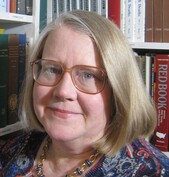
Produce Your Family History Book for $20
by Diane MacLean Boumenot
Thursday, March 28, 2019, 6:30 PM
Chicopee Public Library
Self-publishing has gotten easier and cheaper in the last 10 years. For those who have spent decades researching a family tree, gathering stories and pictures, but keep delaying the production of a book, now is a good time to explore the next steps. Learn how your digital documents can come together to produce a book that is affordable and simple to distribute within your family, ready to be discovered years from now by your family's next "story keeper." It's not hard, and you can easily start with just one book. Samples will be on display.
Diane MacLean Boumenot specializes in southern New England genealogy research, including work on her own ancestors, who were among the original settlers of Massachusetts and Rhode Island. She publishes her genealogy adventures on her website, One Rhode Island Family. In 2018 she co-authored, with Maureen Taylor, the National Genealogical Society's NGS Research in the States volume, Research in Rhode Island. Diane speaks locally and also on Legacy Family Tree Webinars. She holds a B.A. in American History and English from Wesleyan University. Diane is also a graduate of ProGen 28.
by Diane MacLean Boumenot
Thursday, March 28, 2019, 6:30 PM
Chicopee Public Library
Self-publishing has gotten easier and cheaper in the last 10 years. For those who have spent decades researching a family tree, gathering stories and pictures, but keep delaying the production of a book, now is a good time to explore the next steps. Learn how your digital documents can come together to produce a book that is affordable and simple to distribute within your family, ready to be discovered years from now by your family's next "story keeper." It's not hard, and you can easily start with just one book. Samples will be on display.
Diane MacLean Boumenot specializes in southern New England genealogy research, including work on her own ancestors, who were among the original settlers of Massachusetts and Rhode Island. She publishes her genealogy adventures on her website, One Rhode Island Family. In 2018 she co-authored, with Maureen Taylor, the National Genealogical Society's NGS Research in the States volume, Research in Rhode Island. Diane speaks locally and also on Legacy Family Tree Webinars. She holds a B.A. in American History and English from Wesleyan University. Diane is also a graduate of ProGen 28.
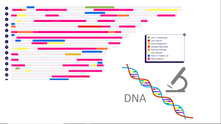
Fall 2018 Meeting
The ABCs of DNA: First Steps in Understanding and Using Your DNA Test Result
by Julie Roberts Szczepankiewicz
DNA testing has become increasingly popular among genealogists, yet many people don’t really understand what to do with their test results or how to use them to verify and extend their family trees. After a brief overview of the different kinds of DNA tests available (autosomal, mitochondrial, y-DNA) and their applications in research, Julie will focus on autosomal DNA testing. She'll explain what to do with your results after they arrive, suggest resources for evaluating and analyzing your DNA matches, discuss third-party sites for uploading your raw DNA data, and offer some do’s and don’t’s for collaborating with DNA cousins.
Julie Roberts Szczepankiewicz is a professional genealogist, writer, and speaker with 20 years of experience in researching her family's origins in Poland, Germany, the U.S. and Canada. She volunteers as an administrator and regular contributor to the Facebook groups, "Polish Genealogy," and "Genealogy Translations." She is the author of several articles which have been published in the PGSA journal Rodziny, and she is also the author of a genealogy blog, "From Shepherds and Shoemakers."
The ABCs of DNA: First Steps in Understanding and Using Your DNA Test Result
by Julie Roberts Szczepankiewicz
DNA testing has become increasingly popular among genealogists, yet many people don’t really understand what to do with their test results or how to use them to verify and extend their family trees. After a brief overview of the different kinds of DNA tests available (autosomal, mitochondrial, y-DNA) and their applications in research, Julie will focus on autosomal DNA testing. She'll explain what to do with your results after they arrive, suggest resources for evaluating and analyzing your DNA matches, discuss third-party sites for uploading your raw DNA data, and offer some do’s and don’t’s for collaborating with DNA cousins.
Julie Roberts Szczepankiewicz is a professional genealogist, writer, and speaker with 20 years of experience in researching her family's origins in Poland, Germany, the U.S. and Canada. She volunteers as an administrator and regular contributor to the Facebook groups, "Polish Genealogy," and "Genealogy Translations." She is the author of several articles which have been published in the PGSA journal Rodziny, and she is also the author of a genealogy blog, "From Shepherds and Shoemakers."
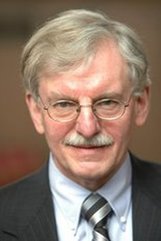
The History of Polish Heraldry
By Marek Lesniewski-Laas, J.D., Honorary Consul for the Republic of Poland
Thursday, June 29, 2017, 6:30 p.m.
Chicopee Public Library
Our speaker for our summer meeting will be Mr. Marek Lesniewski-Laas, the Honorary Consul for the Republic of Poland. The title of his talk is The History of Polish Heraldry. Our speaker will cover the concept of heraldry in Poland, noble and state heraldry, heraldry among Polish Jewry, the structure of the Polish nobles, how the nobility differed from other European countries and other features. The talk is illustrated with many colorful heraldic examples that were significant in the history in Poland. One might see the crest that Babcia spoke of! This is a very interesting and popular talk enjoyed.
Attorney Lesniewski-Laas has an AB from Bowdoin College and a JD from Boston University School of Law and is admitted to the practice of law before US Supreme Court, US First Circuit Court of Appeals, the US District Courts of Mass and CT, and the Supreme Judicial Courts of Mass and NY. He visits western Mass often.
“Now I’ve Found It, What Does It Say?” - Foreign Languages and Genealogical Research
by Jonathan Shea
Sunday, May 21, 2017, 2:00 p.m.
Framingham Public Library
49 Lexington Street, Framingham, MA 01702
This lecture will examine the various phonetic and grammatical features of record keeping languages used in nineteenth century partitioned Poland. Special attention will be given to features of the Slavic languages which confuse the English speaker. Various frequently encountered document formats, such as birth, marriage and death records will be viewed in Latin, Polish and Russian. A sample document will be examined in depth and translated. In addition, phonetic features of Polish and English will be reviewed so that participants will gain a greater understanding of why and how surnames have been misspelled in the US.
Jonathan D. Shea has two decades of experience teaching languages at the college level and served on the faculty of Central Connecticut State University, Tunxis Community College and Trinity College before joining the faculty of Housatonic Community College. His academic preparation in the field of languages and linguistics has been enriched by living experience in Europe and study at the Universidad de Madrid in Spain, St Petersburg State University in Russia and the Uniwersytet Jagiellonski in Poland.
Prof. Shea is a trained archivist and professional genealogist with specialization in Eastern Europe and Ireland and frequently lectures and presents workshops nationwide on the topics of document translation and other linguistic issues, immigration history, and European archival resources. He is the founding President of the Polish Genealogical Society of Connecticut and the Northeast, Inc. He serves as its translator and editor of its journal, Pathways and Passages.
By Marek Lesniewski-Laas, J.D., Honorary Consul for the Republic of Poland
Thursday, June 29, 2017, 6:30 p.m.
Chicopee Public Library
Our speaker for our summer meeting will be Mr. Marek Lesniewski-Laas, the Honorary Consul for the Republic of Poland. The title of his talk is The History of Polish Heraldry. Our speaker will cover the concept of heraldry in Poland, noble and state heraldry, heraldry among Polish Jewry, the structure of the Polish nobles, how the nobility differed from other European countries and other features. The talk is illustrated with many colorful heraldic examples that were significant in the history in Poland. One might see the crest that Babcia spoke of! This is a very interesting and popular talk enjoyed.
Attorney Lesniewski-Laas has an AB from Bowdoin College and a JD from Boston University School of Law and is admitted to the practice of law before US Supreme Court, US First Circuit Court of Appeals, the US District Courts of Mass and CT, and the Supreme Judicial Courts of Mass and NY. He visits western Mass often.
“Now I’ve Found It, What Does It Say?” - Foreign Languages and Genealogical Research
by Jonathan Shea
Sunday, May 21, 2017, 2:00 p.m.
Framingham Public Library
49 Lexington Street, Framingham, MA 01702
This lecture will examine the various phonetic and grammatical features of record keeping languages used in nineteenth century partitioned Poland. Special attention will be given to features of the Slavic languages which confuse the English speaker. Various frequently encountered document formats, such as birth, marriage and death records will be viewed in Latin, Polish and Russian. A sample document will be examined in depth and translated. In addition, phonetic features of Polish and English will be reviewed so that participants will gain a greater understanding of why and how surnames have been misspelled in the US.
Jonathan D. Shea has two decades of experience teaching languages at the college level and served on the faculty of Central Connecticut State University, Tunxis Community College and Trinity College before joining the faculty of Housatonic Community College. His academic preparation in the field of languages and linguistics has been enriched by living experience in Europe and study at the Universidad de Madrid in Spain, St Petersburg State University in Russia and the Uniwersytet Jagiellonski in Poland.
Prof. Shea is a trained archivist and professional genealogist with specialization in Eastern Europe and Ireland and frequently lectures and presents workshops nationwide on the topics of document translation and other linguistic issues, immigration history, and European archival resources. He is the founding President of the Polish Genealogical Society of Connecticut and the Northeast, Inc. He serves as its translator and editor of its journal, Pathways and Passages.
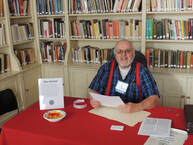
Fall 2016 - Genealogy for Beginners Class - Four Part Class
A series of four (4) 90-120 minute classes on how to research your ancestors will be held this fall at the Polish Center for Discovery and Learning in Chicopee. Admission is free, but registration is necessary. Classes will be on Thursdays Oct 27, Nov 3, 10, and 17 at 10 a.m. and 1:00 p.m. These classes are for the PGSMA and Polish Center members but open to the public.
Alan Doyle Horbal will present an introduction to genealogy along with helpful hints for conducting your research. You will learn how to use the US Census from 1850-1940 and how to find your family entering at Ellis Island and to find relatives coming from Europe and making their way in the United States. Alan will also demonstrate international research for Poland, Galicia, Canada, and England. He will also distribute helpful handouts. Bring a notebook and a pen and start your family tree journey!
About the Instructor: Alan Doyle Horbal has spent over 25 years researching his Ukrainian family that originated in Bartne and doing research at the Polish State Archive in Przemysł. He was a volunteer archivist at the NARA Pittsfield facility until it closed and also volunteered at the Pittsfield Athenaeum. Alan has taught genealogy classes at Williams College and throughout Massachusetts. Alan first spoke to the PGSMA in October 2003. He organized the Computer Genealogy Lab at Chicopee Public Library and is the founder and editor of the Western Massachusetts Genealogy Newsletter.
These classes are co-sponsored by the Polish Center for Discovery and Learning and the Polish Genealogical Society of Massachusetts.
Spring 2017 Meeting
Organizing Your Genealogy
By Hillary Schau, Professional Genealogist
Thursday, March 23, 2017, 6:30 p.m.
Chicopee Public Library
Whether you work solely with paper to manage your genealogy findings, (storing it all in folders, binders or even piles), or whether you love your computer and strive to digitize everything you discover, (using your computer, websites, and genealogy programs), all of us sometimes struggle to locate that one piece of information that we know is there somewhere or we start seeing double as we encounter documents in our collection that are also somewhere else in our files.
In her presentation, Hillary Schau will be providing tips and tricks for both paper and digital genealogists to help better control the vast collection of material that they have been gathering on their family history. She will address both approaches for paper organizing (using files and folders) and for electronic organizing, helping those to settle on a management strategy that makes sense, and is easy to use, and is more efficient in the long run.
About the Speaker
Hillary Schau is professional genealogist from western Mass who has been helping people with their research and individual brick walls for many years. She presents classes on Organizing Genealogy and on RootsMagic (a computer program to manage genealogical information) that generate waiting lists for her next class. She is a 2015 graduate of the Boston University “Genealogical Research Certificate Program” and has been volunteering at the nearby Family Search Affiliate Library (Chicopee Library) for the past few years. She is a member of the Association of Professional Genealogists and the Western Massachusetts Genealogical Society. Although she is now a full-time genealogist, she comes from careers in engineering, education, and computer databases. These give her a uniquely analytical approach to problem solving and patient style for instruction, benefiting the researcher who often needs to look at things from a new perspective.
Fall 2016 Meeting - CSI Meets Roots: Meet a Forensic Genealogist!
Thursday, October 20, 2016, 2 p.m. and 6:30 p.m.
Chicopee Public Library
Forensic scientists and genealogists share the same goal – to find out who was who, and who did what and when. In explaining how to analyze photographs, to mine databases, and to use DNA analysis to reveal family history, Dr. Fitzpatrick will focus on how forensic genealogy can and has been used to solve mysteries from our family’s past.
Forensic Genealogy:” The Database Detective” and “Not Just the Facts, Ma’am, Give me the Big Picture!”
Birth, marriage, and death indexes are three kinds of data familiar to even casual genealogists. But have you ever considered using Amazon or eBay to solve a genealogical mystery? And once you have found the facts you are searching for, how do you “connect the dots” to create a much more meaningful picture of your ancestors’ lives? Forensic Genealogy has used database mining to solve some of the most compelling mysteries of modern genealogy. It offers much insight on how to use data that genealogists often take for granted. Forensic genealogy will not only show you where to look for information, but more importantly how to look at it.
The Secrets of Abraham Lincoln’s DNA
It has been suspected that Abraham Lincoln may have suffered from a variety of genetic disorders including a rare cancer called MEN2B. However it is only recently that DNA testing has become available that could confirm these suspicions that until now have been based solely on Lincoln’s physical appearance and historical reports about the condition of his health. The Abraham Lincoln DNA project is one of the first in the area of Bio-Historical research—the study of how the genetics of historical figures may have influenced the course of world history. This talk will discuss the fascinating secrets that we have so far unlocked about Abraham Lincoln’s DNA.
Colleen Fitzpatrick, PhD, is an internationally recognised forensic genealogist, the founder of Identifinders International. She has been involved in high profile forensic cases, including the identification of the Unknown Child on the Titanic and the Amelia Earhart project; she is now the Forensic Genealogist on the Abraham Lincoln DNA Project. Colleen has also been a key member of team that have exposed three international Holocaust literary frauds. Colleen's collaborations include the Armed Forces DNA Identification Laboratory, the US Army Casualty and Mortuary Affairs Office, the Simon Wiesenthal Center in Jerusalem, the University of Arizona, Harvard Medical School and other noted professional organizations. She is a Fellow of the Society of Photoinstrumentation Engineers (SPIE), an Associate Member of the American Academy of Forensic Science (AAFS), and an Adjunct Professor at Boston University.
A series of four (4) 90-120 minute classes on how to research your ancestors will be held this fall at the Polish Center for Discovery and Learning in Chicopee. Admission is free, but registration is necessary. Classes will be on Thursdays Oct 27, Nov 3, 10, and 17 at 10 a.m. and 1:00 p.m. These classes are for the PGSMA and Polish Center members but open to the public.
Alan Doyle Horbal will present an introduction to genealogy along with helpful hints for conducting your research. You will learn how to use the US Census from 1850-1940 and how to find your family entering at Ellis Island and to find relatives coming from Europe and making their way in the United States. Alan will also demonstrate international research for Poland, Galicia, Canada, and England. He will also distribute helpful handouts. Bring a notebook and a pen and start your family tree journey!
About the Instructor: Alan Doyle Horbal has spent over 25 years researching his Ukrainian family that originated in Bartne and doing research at the Polish State Archive in Przemysł. He was a volunteer archivist at the NARA Pittsfield facility until it closed and also volunteered at the Pittsfield Athenaeum. Alan has taught genealogy classes at Williams College and throughout Massachusetts. Alan first spoke to the PGSMA in October 2003. He organized the Computer Genealogy Lab at Chicopee Public Library and is the founder and editor of the Western Massachusetts Genealogy Newsletter.
These classes are co-sponsored by the Polish Center for Discovery and Learning and the Polish Genealogical Society of Massachusetts.
Spring 2017 Meeting
Organizing Your Genealogy
By Hillary Schau, Professional Genealogist
Thursday, March 23, 2017, 6:30 p.m.
Chicopee Public Library
Whether you work solely with paper to manage your genealogy findings, (storing it all in folders, binders or even piles), or whether you love your computer and strive to digitize everything you discover, (using your computer, websites, and genealogy programs), all of us sometimes struggle to locate that one piece of information that we know is there somewhere or we start seeing double as we encounter documents in our collection that are also somewhere else in our files.
In her presentation, Hillary Schau will be providing tips and tricks for both paper and digital genealogists to help better control the vast collection of material that they have been gathering on their family history. She will address both approaches for paper organizing (using files and folders) and for electronic organizing, helping those to settle on a management strategy that makes sense, and is easy to use, and is more efficient in the long run.
About the Speaker
Hillary Schau is professional genealogist from western Mass who has been helping people with their research and individual brick walls for many years. She presents classes on Organizing Genealogy and on RootsMagic (a computer program to manage genealogical information) that generate waiting lists for her next class. She is a 2015 graduate of the Boston University “Genealogical Research Certificate Program” and has been volunteering at the nearby Family Search Affiliate Library (Chicopee Library) for the past few years. She is a member of the Association of Professional Genealogists and the Western Massachusetts Genealogical Society. Although she is now a full-time genealogist, she comes from careers in engineering, education, and computer databases. These give her a uniquely analytical approach to problem solving and patient style for instruction, benefiting the researcher who often needs to look at things from a new perspective.
Fall 2016 Meeting - CSI Meets Roots: Meet a Forensic Genealogist!
Thursday, October 20, 2016, 2 p.m. and 6:30 p.m.
Chicopee Public Library
Forensic scientists and genealogists share the same goal – to find out who was who, and who did what and when. In explaining how to analyze photographs, to mine databases, and to use DNA analysis to reveal family history, Dr. Fitzpatrick will focus on how forensic genealogy can and has been used to solve mysteries from our family’s past.
Forensic Genealogy:” The Database Detective” and “Not Just the Facts, Ma’am, Give me the Big Picture!”
Birth, marriage, and death indexes are three kinds of data familiar to even casual genealogists. But have you ever considered using Amazon or eBay to solve a genealogical mystery? And once you have found the facts you are searching for, how do you “connect the dots” to create a much more meaningful picture of your ancestors’ lives? Forensic Genealogy has used database mining to solve some of the most compelling mysteries of modern genealogy. It offers much insight on how to use data that genealogists often take for granted. Forensic genealogy will not only show you where to look for information, but more importantly how to look at it.
The Secrets of Abraham Lincoln’s DNA
It has been suspected that Abraham Lincoln may have suffered from a variety of genetic disorders including a rare cancer called MEN2B. However it is only recently that DNA testing has become available that could confirm these suspicions that until now have been based solely on Lincoln’s physical appearance and historical reports about the condition of his health. The Abraham Lincoln DNA project is one of the first in the area of Bio-Historical research—the study of how the genetics of historical figures may have influenced the course of world history. This talk will discuss the fascinating secrets that we have so far unlocked about Abraham Lincoln’s DNA.
Colleen Fitzpatrick, PhD, is an internationally recognised forensic genealogist, the founder of Identifinders International. She has been involved in high profile forensic cases, including the identification of the Unknown Child on the Titanic and the Amelia Earhart project; she is now the Forensic Genealogist on the Abraham Lincoln DNA Project. Colleen has also been a key member of team that have exposed three international Holocaust literary frauds. Colleen's collaborations include the Armed Forces DNA Identification Laboratory, the US Army Casualty and Mortuary Affairs Office, the Simon Wiesenthal Center in Jerusalem, the University of Arizona, Harvard Medical School and other noted professional organizations. She is a Fellow of the Society of Photoinstrumentation Engineers (SPIE), an Associate Member of the American Academy of Forensic Science (AAFS), and an Adjunct Professor at Boston University.
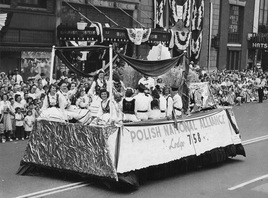 A float sponsored by Polish National Alliance Lodge 758 travels along Main Street during Worcester's 1948 centennial parade. A national fraternal benefit society, the PNA offered wide-ranging programs. By 1964, it had 2,500 members in Worcester County, with lodges in Blackstone, Dudley, East Douglas, Farnumsville, Gardner, Southbridge, Webster, and Worcester.
A float sponsored by Polish National Alliance Lodge 758 travels along Main Street during Worcester's 1948 centennial parade. A national fraternal benefit society, the PNA offered wide-ranging programs. By 1964, it had 2,500 members in Worcester County, with lodges in Blackstone, Dudley, East Douglas, Farnumsville, Gardner, Southbridge, Webster, and Worcester.
Summer 2016 Meeting
Worcester 'Powiat': Polonia in Central Massachusetts
Sunday, June 26, 2016, 2 pm to approx. 4:30 pm
Our Lady of Czestochowa Parish Hall
Worcester, MA
Today more than 50,000 people in Worcester County self-identify as Polish Americans, the majority descending from immigrants who settled in Central Massachusetts a century or more ago. These ethnic Poles came not from a sovereign nation called Poland but from the German, Austrian, and Russian empires. Overlooking their disparate places of origin, they bonded to create a vibrant web of relationships in their new shared county—Worcester powiat, as it might be called in Polish.
In Clinton, Dudley, Gardner, Southbridge, Webster, West Warren, and Worcester, they organized Polish parishes. In other towns with significant Polish populations, such as Fitchburg, Gilbertville, South Grafton, and Uxbridge, they founded Polish homes and Pilsudski clubs. And they traveled countywide to support and celebrate their shared ethnic heritage at a broad range of religious, social, athletic, and cultural activities.
What do we know today of their lives a century ago? How can we trace our own Polish families back from Central Massachusetts to Europe? This program will consider the chain migration that brought the immigrants from their places of origin through European and American ports to their ultimate settlement in Massachusetts, focusing on the myriad organizations and events that unified them here. Finally, it will identify a variety of helpful resources for documenting these Polish lives in Worcester County.
The granddaughter of Polish immigrants, Barbara Proko grew up in Worcester and graduated from St. Mary's High School (New England's only co-ed Polish secondary school). Over the past two decades, she has traced her ancestral Polish lines back to the 1700s, largely through microfilmed Latin, Polish, and Russian records of Roman Catholic parishes in the Lida region. Some of her family history research appears online in her blog, Basia's Polish Family: From Wilno to Worcester <www.wilnoworcester.blogspot.com>. A graduate of the University of Massachusetts, Amherst, Barbara has enjoyed a long career in journalism, reporting and editing at Maine newspapers; in public relations for nonprofit organizations; in e-book publishing; and in academic magazine editing. She served as the project manager and lead coauthor of three Arcadia Publishing books: The Polish Community of Worcester (2003), The Polish Community of New Britain (2005), and Worcester County's Polish Community (2007). She has appeared as a speaker and workshop presenter at a variety of genealogical society, library, community, and historical association events.
Worcester 'Powiat': Polonia in Central Massachusetts
Sunday, June 26, 2016, 2 pm to approx. 4:30 pm
Our Lady of Czestochowa Parish Hall
Worcester, MA
Today more than 50,000 people in Worcester County self-identify as Polish Americans, the majority descending from immigrants who settled in Central Massachusetts a century or more ago. These ethnic Poles came not from a sovereign nation called Poland but from the German, Austrian, and Russian empires. Overlooking their disparate places of origin, they bonded to create a vibrant web of relationships in their new shared county—Worcester powiat, as it might be called in Polish.
In Clinton, Dudley, Gardner, Southbridge, Webster, West Warren, and Worcester, they organized Polish parishes. In other towns with significant Polish populations, such as Fitchburg, Gilbertville, South Grafton, and Uxbridge, they founded Polish homes and Pilsudski clubs. And they traveled countywide to support and celebrate their shared ethnic heritage at a broad range of religious, social, athletic, and cultural activities.
What do we know today of their lives a century ago? How can we trace our own Polish families back from Central Massachusetts to Europe? This program will consider the chain migration that brought the immigrants from their places of origin through European and American ports to their ultimate settlement in Massachusetts, focusing on the myriad organizations and events that unified them here. Finally, it will identify a variety of helpful resources for documenting these Polish lives in Worcester County.
The granddaughter of Polish immigrants, Barbara Proko grew up in Worcester and graduated from St. Mary's High School (New England's only co-ed Polish secondary school). Over the past two decades, she has traced her ancestral Polish lines back to the 1700s, largely through microfilmed Latin, Polish, and Russian records of Roman Catholic parishes in the Lida region. Some of her family history research appears online in her blog, Basia's Polish Family: From Wilno to Worcester <www.wilnoworcester.blogspot.com>. A graduate of the University of Massachusetts, Amherst, Barbara has enjoyed a long career in journalism, reporting and editing at Maine newspapers; in public relations for nonprofit organizations; in e-book publishing; and in academic magazine editing. She served as the project manager and lead coauthor of three Arcadia Publishing books: The Polish Community of Worcester (2003), The Polish Community of New Britain (2005), and Worcester County's Polish Community (2007). She has appeared as a speaker and workshop presenter at a variety of genealogical society, library, community, and historical association events.
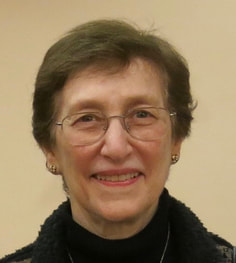 Fay Bussgang
Fay Bussgang
Joint Meeting of PGSMA and Jewish Genealogical Society of Greater Boston
Books of Residents & Other Valuable Polish Records
Sunday, May 1, 2016
Goodnow Library
Sudbury, MA
There are many valuable genealogical resources in Poland beyond vital records, some of which are now available online. The most informative are Books of Residents (Księgi Ludności). These are 19th–20th century municipal registration books that have survived for many towns. They contain detailed information about all the inhabitants in each household who had their legal residence in that community. Other useful documents include business directories, passport and I.D. applications, notary records, deportation to Siberia records, professional and military records. Fay and Julian Bussgang will show examples of data from these sources and explain how to access them. This talk will focus on documents that are not connected to any particular religious group but apply to all who have roots in Poland.
Fay Bussgang has authored over 20 articles on genealogy, as well as the chapter “Russian Poland” in the Avotaynu Guide to Jewish Genealogy. Fay and her husband, Julian, have done extensive genealogical research during 14 trips to Poland. Fay served as co-president of the Jewish Genealogical Society of Greater Boston in 1998–2000.
Julian Bussgang, born in Lwów, Poland, fled with his family in September 1939 to Romania and then to Palestine. There he joined the Polish 2nd Corps (Anders Army) and fought in the Italian campaign. After the fall of communism, he served in Warsaw and Krakow as a volunteer with the International Executive Service Corps. In 2011, he received the Knight’s Cross of the Order of Merit of the Republic of Poland for his activities promoting Polish-Jewish dialogue.
Books of Residents & Other Valuable Polish Records
Sunday, May 1, 2016
Goodnow Library
Sudbury, MA
There are many valuable genealogical resources in Poland beyond vital records, some of which are now available online. The most informative are Books of Residents (Księgi Ludności). These are 19th–20th century municipal registration books that have survived for many towns. They contain detailed information about all the inhabitants in each household who had their legal residence in that community. Other useful documents include business directories, passport and I.D. applications, notary records, deportation to Siberia records, professional and military records. Fay and Julian Bussgang will show examples of data from these sources and explain how to access them. This talk will focus on documents that are not connected to any particular religious group but apply to all who have roots in Poland.
Fay Bussgang has authored over 20 articles on genealogy, as well as the chapter “Russian Poland” in the Avotaynu Guide to Jewish Genealogy. Fay and her husband, Julian, have done extensive genealogical research during 14 trips to Poland. Fay served as co-president of the Jewish Genealogical Society of Greater Boston in 1998–2000.
Julian Bussgang, born in Lwów, Poland, fled with his family in September 1939 to Romania and then to Palestine. There he joined the Polish 2nd Corps (Anders Army) and fought in the Italian campaign. After the fall of communism, he served in Warsaw and Krakow as a volunteer with the International Executive Service Corps. In 2011, he received the Knight’s Cross of the Order of Merit of the Republic of Poland for his activities promoting Polish-Jewish dialogue.
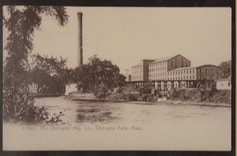 “Chicopee Manufacturing Company,” Chicopee Archives Online, accessed January 7, 2016, http://www.chicopeepubliclibrary.org/archives/items/show/3839
“Chicopee Manufacturing Company,” Chicopee Archives Online, accessed January 7, 2016, http://www.chicopeepubliclibrary.org/archives/items/show/3839
Spring 2016 Meeting - The Mills of Greater Chicopee and the Polish Immigrant Experience
Thursday, March 24, 2016, 6:30 PM
Chicopee Public Library
Stephen Jendrysik, retired History teacher and lifelong local historian of Chicopee,will share his knowledge of the mills and manufacturing plants of Chicopee including the Polish immigrants who worked there during the first half of the 20th century. Some of the mills that will be noted are: Lyman Company (rags), Dwight Mills (sheeting), Chicopee Mfg. (gauze & bandages), Fisk (tires), Moore Drop Forge (wrenches) and others. Question and answer period to follow. The public is welcome to attend at no charge. Bring a friend too! Directions are available on the library website.
Spend a Day of Genealogy with Steve Morse
Saturday, October 10, 2015
Our Lady of the Elms College - Mary Dooley Campus Center
Chicopee, Massachusetts
The PGSMA in collaboration with the Polish Center of Discovery & Learning and the Chicopee Cultural Council is pleased to announce that a renowned genealogist and computer professional is coming to Chicopee to present a full day of talks. Stephen Morse, PhD is the creator of the One-Step Website for which he has received both the Lifetime Achievement Award and the Outstanding Contribution Award from the International Association of Jewish Genealogical Societies, Award of Merit from the National Genealogical Society, first-ever Excellence Award from the Association of Professional Genealogists, and two awards that he cannot pronounce from Polish genealogical societies. In his other life Morse is a computer professional with a doctorate degree in electrical engineering. He has held various research, development, and teaching positions, authored numerous technical papers, written four textbooks, and holds four patents. He is best known as the architect of the Intel 8086 (the granddaddy of today's Pentium processor), which sparked the PC revolution 30 years ago.
Sponsored by the Chicopee Cultural Council and the Polish Center of Discovery & Learning
Thursday, March 24, 2016, 6:30 PM
Chicopee Public Library
Stephen Jendrysik, retired History teacher and lifelong local historian of Chicopee,will share his knowledge of the mills and manufacturing plants of Chicopee including the Polish immigrants who worked there during the first half of the 20th century. Some of the mills that will be noted are: Lyman Company (rags), Dwight Mills (sheeting), Chicopee Mfg. (gauze & bandages), Fisk (tires), Moore Drop Forge (wrenches) and others. Question and answer period to follow. The public is welcome to attend at no charge. Bring a friend too! Directions are available on the library website.
Spend a Day of Genealogy with Steve Morse
Saturday, October 10, 2015
Our Lady of the Elms College - Mary Dooley Campus Center
Chicopee, Massachusetts
The PGSMA in collaboration with the Polish Center of Discovery & Learning and the Chicopee Cultural Council is pleased to announce that a renowned genealogist and computer professional is coming to Chicopee to present a full day of talks. Stephen Morse, PhD is the creator of the One-Step Website for which he has received both the Lifetime Achievement Award and the Outstanding Contribution Award from the International Association of Jewish Genealogical Societies, Award of Merit from the National Genealogical Society, first-ever Excellence Award from the Association of Professional Genealogists, and two awards that he cannot pronounce from Polish genealogical societies. In his other life Morse is a computer professional with a doctorate degree in electrical engineering. He has held various research, development, and teaching positions, authored numerous technical papers, written four textbooks, and holds four patents. He is best known as the architect of the Intel 8086 (the granddaddy of today's Pentium processor), which sparked the PC revolution 30 years ago.
Sponsored by the Chicopee Cultural Council and the Polish Center of Discovery & Learning
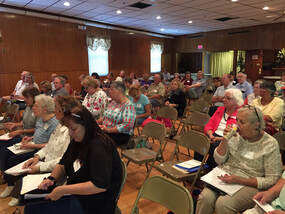
Planting and Growing Your Polish Family Tree: A PGSMA Outreach in Lowell
Sponsored by the Lowell Polish Cultural Committee
Sunday, September 20, 2015, 1pm to 4pm
Dom Polski / Polish National Home Lowell
Lowell, MA
Are you interested in learning more about Polish Genealogy and getting started or restarted on a family tree? The Lowell Polish Cultural Committee and the Polish Genealogical Society of Massachusetts are pleased to present an afternoon of Eastern European research assistance and education especially for those in Eastern Massachusetts. Two talks will be presented: "Beginning Your Genealogy" by Alan Doyle Horbal and "Overlooked Municipal Records" by Sara Campbell. Following the talks we'll have research assistance, translation assistance, and a chance to mingle.
A Well-Worn Path: Migration from Dobrzechów and Kożuchów to Massachusetts, 1898-1924
by Patricia Bury Yocum
Thursday, June 18, 2015, 6:30 PM
Chicopee Public Library
Dobrzechów and Kożuchów are neighboring villages in modern-day Podkarpackie Province, Poland. According to Ellis Island records more than 250 immigrants from the two villages entered the U.S. between 1898 and 1924. Most of these immigrants went to New England with more than 40% going to places in Western Massachusetts such as Chicopee, Thorndike, Holyoke, Ware and Adams. Patricia Yocum, our June speaker, will discuss who these immigrants were and what they might tell us about Polish immigration from Galicia.
Beginning in 1898 U.S. law required that the immigrant’s last place of residence be recorded on the ship’s manifest. Using the village names, Dobrzechów and Kożuchów, and Stephen Morse’s search engine, Searching the New York (Ellis Island gold) Database in One Step, Patricia queried the Ellis Island database for immigrants. For each one found she entered pertinent data into an Excel spreadsheet. Data collected included the immigrant’s name, age, gender, marital status, literacy status, destination, arrival date and traveling companions. Where available, birthplace, name of a contact person in the home village, name and address of the person the immigrant was joining in the U.S., and any previous stay in the U.S. were also noted. Patricia then sorted the data by type to reveal patterns among the immigrants and a broader picture of migration from a micro region. The results of her studies appear in two papers, “Leaving Dobrzechów: Immigration From a Galician Village” (2013) and “Leaving Kożuchów, a Village in Dobrzechów Parish, Galicia” (2015), both published in Polish American Studies.
Although some immigrants returned to their home villages, many remained in Massachusetts where their descendants may still reside. Perhaps you are one of them! Join us as we discuss a special group of immigrants and the villages from which they came.
About the speaker: A native of Utica, N.Y., Patricia earned a B.A. in English literature from Harpur College, SUNY Binghamton, an M.A. in English Literature and an A.M.L.S. both from the University of Michigan where she subsequently served as a science librarian. Her interest in family history dates from her childhood and was fostered by stories of her grandparents’ immigration from Galicia. Beyond the basic facts Patricia wanted to know why and how they immigrated and how their experiences related to those of other immigrants from the region. For the past several years she has been able to delve more deeply into these questions and into Polish immigration history in general. Among the results of her research are the files of immigrants from Dobrzechów and Kożuchów. She continues to find additional immigrants to add to each file and has begun to move backward in time, searching for villagers who arrived before 1898. She warmly welcomes such contributions!
Patricia has been an active genealogist for over 15 years and has given talks in Michigan and Florida on researching Polish genealogy and immigration history. She is a member of the Polish Genealogical Society of America, the Polish Genealogical Society of Michigan, and the Polish Genealogical Society of Connecticut and the Northeast. Now a librarian emerita, she resides with her husband Charles in Ann Arbor Michigan. She can be reached at [email protected].
Sponsored by the Lowell Polish Cultural Committee
Sunday, September 20, 2015, 1pm to 4pm
Dom Polski / Polish National Home Lowell
Lowell, MA
Are you interested in learning more about Polish Genealogy and getting started or restarted on a family tree? The Lowell Polish Cultural Committee and the Polish Genealogical Society of Massachusetts are pleased to present an afternoon of Eastern European research assistance and education especially for those in Eastern Massachusetts. Two talks will be presented: "Beginning Your Genealogy" by Alan Doyle Horbal and "Overlooked Municipal Records" by Sara Campbell. Following the talks we'll have research assistance, translation assistance, and a chance to mingle.
A Well-Worn Path: Migration from Dobrzechów and Kożuchów to Massachusetts, 1898-1924
by Patricia Bury Yocum
Thursday, June 18, 2015, 6:30 PM
Chicopee Public Library
Dobrzechów and Kożuchów are neighboring villages in modern-day Podkarpackie Province, Poland. According to Ellis Island records more than 250 immigrants from the two villages entered the U.S. between 1898 and 1924. Most of these immigrants went to New England with more than 40% going to places in Western Massachusetts such as Chicopee, Thorndike, Holyoke, Ware and Adams. Patricia Yocum, our June speaker, will discuss who these immigrants were and what they might tell us about Polish immigration from Galicia.
Beginning in 1898 U.S. law required that the immigrant’s last place of residence be recorded on the ship’s manifest. Using the village names, Dobrzechów and Kożuchów, and Stephen Morse’s search engine, Searching the New York (Ellis Island gold) Database in One Step, Patricia queried the Ellis Island database for immigrants. For each one found she entered pertinent data into an Excel spreadsheet. Data collected included the immigrant’s name, age, gender, marital status, literacy status, destination, arrival date and traveling companions. Where available, birthplace, name of a contact person in the home village, name and address of the person the immigrant was joining in the U.S., and any previous stay in the U.S. were also noted. Patricia then sorted the data by type to reveal patterns among the immigrants and a broader picture of migration from a micro region. The results of her studies appear in two papers, “Leaving Dobrzechów: Immigration From a Galician Village” (2013) and “Leaving Kożuchów, a Village in Dobrzechów Parish, Galicia” (2015), both published in Polish American Studies.
Although some immigrants returned to their home villages, many remained in Massachusetts where their descendants may still reside. Perhaps you are one of them! Join us as we discuss a special group of immigrants and the villages from which they came.
About the speaker: A native of Utica, N.Y., Patricia earned a B.A. in English literature from Harpur College, SUNY Binghamton, an M.A. in English Literature and an A.M.L.S. both from the University of Michigan where she subsequently served as a science librarian. Her interest in family history dates from her childhood and was fostered by stories of her grandparents’ immigration from Galicia. Beyond the basic facts Patricia wanted to know why and how they immigrated and how their experiences related to those of other immigrants from the region. For the past several years she has been able to delve more deeply into these questions and into Polish immigration history in general. Among the results of her research are the files of immigrants from Dobrzechów and Kożuchów. She continues to find additional immigrants to add to each file and has begun to move backward in time, searching for villagers who arrived before 1898. She warmly welcomes such contributions!
Patricia has been an active genealogist for over 15 years and has given talks in Michigan and Florida on researching Polish genealogy and immigration history. She is a member of the Polish Genealogical Society of America, the Polish Genealogical Society of Michigan, and the Polish Genealogical Society of Connecticut and the Northeast. Now a librarian emerita, she resides with her husband Charles in Ann Arbor Michigan. She can be reached at [email protected].
